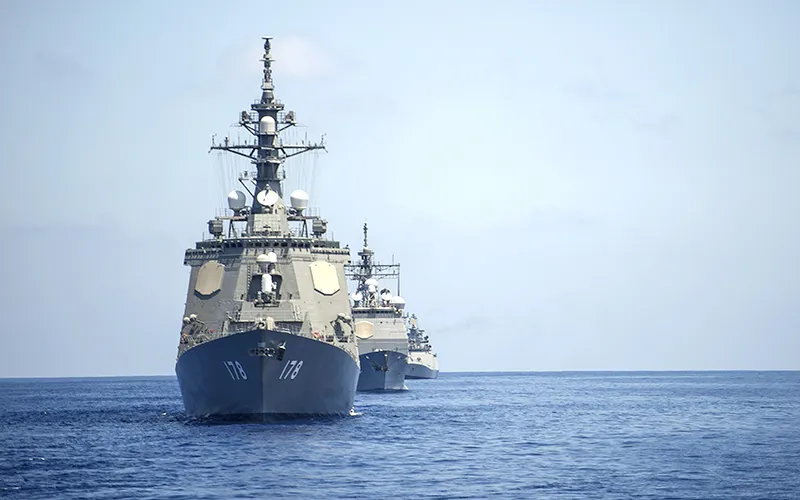-
CENTRES
Progammes & Centres
Location
For Japan, which deployed missile destroyer J S Fuyuzuki and SH 60K helicopters on India's invitation, the Malabar Exercise signals the growing importance of ties between the two nations as well as the personal importance that PM Modi has attached to India's strategic ties with Japan.

The navies of India, United States and Japan finished the five-day Malabar exercise held earlier this month. October 2015. The exercise (Oct 14-19) was aimed at bolstering naval cooperation, and enhancing interoperability of the navies in order to address traditional, as well as non traditional security challenges in the Indo-Pacific. Taking place in the Bay of Bengal, Exercise Malabar, traditionally a bilateral US-India annual event, albeit with foreign invitees, will now be permanently designated a trilateral US-Japan-India exercise. With growing Japanese engagement in this region, as well as an increasing unease to China's rise, what would this move mean for Japan?
Started in 1992, as a bilateral naval exercise between the US and India, Exercise Malabar has grown to include other nations such as Australia, and Singapore. In 2007, Japan had also taken part in the expanded Malabar exercise which was held in the Bay of Bengal. However Beijing went on a diplomatic offensive, and lodged a strong protest citing claims of "encirclement" and "containment". Since then Japan only took part in the 2009, and 2014 edition that were held in the north-Western Pacific and not in the Bay.
The growing Chinese presence in the Indo-Pacific, and its assertive behaviour in the East and South China seas has been, and is still a growing concern for Japan, as well as other major players in the region such as the US and India. A number of moves by the Chinese government such as the docking of a Chinese boat in Sri Lanka, as well as two submarines - one at Karachi earlier this year, and one at a Sri Lankan port late last year have all been a cause for legitimate concern.
Thus, the participation of Japan and its inclusion as a permanent member in Exercise Malabar is an important step for each of the nations involved independently, as well as collectively. For Japan, which deployed missile destroyer J S Fuyuzuki and SH 60K helicopters on India's invitation, it signals the growing importance of ties between the two nations as well as the personal importance that Prime Minister Narendra Modi has attached to India's strategic ties with Japan. For India it signals a willingness to exercise a more assertive maritime posture under the Modi government, unlike the more conservative stance taken by the UPA government.For the US, the exercise is a means to underline the Indo-Japan-US trilateral cooperation in the maritime domain in light of its Pacific Rebalance.
For many years, the Japanese Government has understood the growing importance of the Indo-Pacific region. Indeed in his first stint as Prime Minister, Abe in 2007 addressing the Indian Parliament, was the progenitor of the "Quadrilateral Initiative". This was to be a concert of four democracies - Japan, India, Australia and the US - working to promote shared the ideals of peace, freedom of navigation, and stability. However, not willing to jeopardize relations with China, this initiative was this was quick to be shot down by India and Australia.
Fast forward eight years, Prime Minister Abe addressing a joint session of the US congress unveiled Japan's new banner of being a "proactive contributor to peace". In order to ensure that this statement becomes a reality, the Japanese Government has taken a number of steps, which can complement its new found inclusion as a permanent member in Exercise Malabar. The Japanese Diet passed a new package of security bills that mark a significant departure from Japan's pacifist posture in the post-World War II era. These laws mean that Japan's Self Defence Force (SDF) can now come to the aid of the United States and other friendly nations in case of an armed attack against them, even if Japan is not directly under attack. They would also enable Japan to play a bigger role in taking up security responsibilities under the U.S.-Japan alliance.
Further, whether to balance a growing Chinese presence, or bolster the Japanese economy through Abenomics, or both, Abe has begun to forge stronger ties with many nations in the South Asian region such as India, Sri Lanka, Bangladesh, Myanmar and Thailand. Japanese investment in this region is on the rise and a number of large projects with Bay states form a salient aspect of Japan's strategy in South Asia.
In light of these developments, the trade volume in this region is only set to grow. Much of Japan's trade, especially its oil imports from the Middle East already reach Japan via the Strait of Malacca. It is therefore in the national interest of the Japanese government to ensure clear Sea Lanes of Communication (SLOC). While the Abe administration has been taking the necessary steps to improve maritime security in the Malacca Straits, Japan's permanent addition will enhance its ability to ensure that such issues are properly addressed. This move will lead to increased coordination and sharing of information with India which has a strong presence in this region.
The 2014 Tokyo Declaration saw both Japan and India upgrade their relations to that of a 'Special Strategic and Global Partnership'. While it is evident that economic relations between Japan and India have grown from strength to strength, what was lacking was for these nations to engage more effectively in the strategic sphere. By permanently including Japan, we see Indo-Japanese strategic ties being bolstered, and a deepening of trust between the two.
(Vindu Mai Chotani is a Research Assistant at Observer Research Foundation, New Delhi)
The views expressed above belong to the author(s). ORF research and analyses now available on Telegram! Click here to access our curated content — blogs, longforms and interviews.